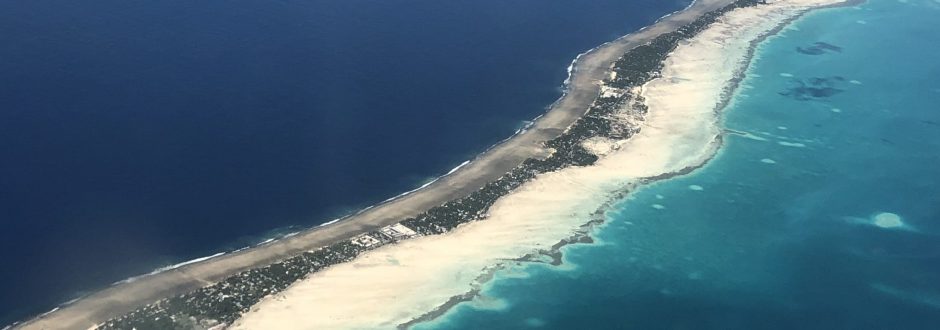At the heart of these global crises is the fate of the whole of God’s Creation, including humanity – those given the responsibility to care for and steward the Earth, writes Sister Veronica McDougall.
By Veronica McDougall SGS
The Australian Defence Force (ADF) has recently warned of “a possible influx of climate refugees and an increased potential for conflict because of the effects of climate change”. The information, obtained by the ABC, went on to highlight predictions that the Indo-Pacific region will experience prolonged droughts and increased flooding from rising sea-levels. The ADF is also reportedly concerned about “the potential for conflict” and the “undermining of economic development in our immediate region”.
The United Nations High Commissioner for Refugees (UNHCR) definition of a refugee is a person who is unable or unwilling to return to their country of origin owing to a well-founded fear of being persecuted for reasons of race, religion, nationality, political opinion or member in a particular social group.
Australia adheres to the UNHCR definition, but with the growing effects of climate change, we see a new problem arising.
Where do the thousands of people affected by climate change, being forced to leave their countries of origin and culture, ‘fit’ into the official definition of a refugee?
When this definition was formulated in 1951, the environmental crisis was in the making, but not yet apparent. Today’s so-called ‘climate refugees’ do not meet the conventional criteria, yet their needs are as great as those who do. The ADF has a right to be concerned about the potential influx of people displaced by environmental changes.
For me, the common denominator in both the displacement of people and climate change is the human face of my brother and sister. While the Australian Government is busy counting and turning away boats, being persistent in mining and exporting coal and continuing emissions with a focus on the economy, small islands in the Pacific are disappearing.
The climate change crisis was one of the dominating issues at the recent Pacific Island Forum held in August, on the island of Tuvalu – one of the world’s most underdeveloped nations greatly affected by climate change.
Many Pacific Island nations had hoped for a strong statement and commitment to ending coal-fired power, the limiting of temperature rises to 1.5 degrees Celsius, and achieving zero net carbon emissions by 2050.
While the Pacific Island nations are committed to these, Australia has held out on those targets, instead promising money for projects in the islands concerned. The final communique from the Forum was a watered down version of what was desired by the majority. Prime Minister Scott Morrison said he was “accountable to the Australian people”. I wonder what the majority of Australians know, feel and think about this situation.
One Pacific nation currently being affected by the climate change crisis is Kiribati – a country made up of a number of coral atolls. As sea levels rise, people are moving to the main island of Tarawa and overpopulation is becoming a problem. Our Good Samaritan Sisters, who live in two communities on Tarawa, have expressed their concerns about the overcrowding and the subsequent issues of providing basic needs, infrastructure and employment. Over recent years they have noted the rise in sea levels, which in some instances cover burial areas, and the lessening availability of fresh water.
Scientists, ecologists and the media regularly bring the issues of climate change and people seeking refuge before us and the solutions offered by them are ignored or buried. There may well be an underlying hope that people will stop coming and that climate change issues are not as serious as they are presented to us. But the fact is, these global issues will not go away until we acknowledge their existence and do our part to remedy them. The future global crisis, due to the changing environment, needs to be included in our awareness and prepared for now.
I have the privilege of meeting with people who are new to our country. They come from different countries, different belief systems and difficult life experiences. What they have in common is their desire for a safe haven, for themselves and their children, and to make a positive contribution to our communities. They are prepared to learn about our culture and to speak new languages. They do any work which is available, and at times this means jobs that many of us would be less inclined to do. I, in turn, have learnt so much from them, especially about hope and resilience. There are of course many communities, individuals and welfare groups working very hard to assist people seeking a new home here. The same can be said about the many individuals and groups who are working to promote better living practices to reclaim our Earth.
At the heart of these global crises is the fate of the whole of God’s Creation, including humanity – those given the responsibility to care for and steward the Earth.
A crisis is an invitation to call forth the creative gifts God has given us. It is a time to employ our imagination to come up with solutions for these overwhelmingly complex situations. Collectively, the answers are deep within us waiting to be explored and brought to fruition.
I wonder, instead of contemplating the risk these reported ‘climate refugees’ pose around conflict and our economic status, would it not be more beneficial for the victims of climate change if Australia became a ‘good neighbour’ and put resources into providing safe haven for them? After all, we sing in our national anthem of the “boundless plains to share”.
It is time for us to step up and become a leading country, in coming to the aid of not only displaced people, for whatever the reason, but also of ‘Our Common Home’, our planet Earth.
